Table of Contents
An absolute phrase is a simple yet powerful way to make your writing more descriptive and engaging. It helps add extra details to a sentence, allowing readers to better understand the scene or action.
Commonly used in stories, essays, and creative writing, absolute phrases can make sentences more interesting and understandable. Learning to use them is an easy step toward improving your overall writing skills, even for beginners.
What is an Absolute Phrase?
Examples of Absolute Phrases:
The sun rising, they started their journey.
Her hands shaking, she opened the letter.
The work done, he went home.
Structure of an Absolute Phrase
An absolute phrase follows a simple structure:
- Noun or Pronoun: The main subject of the phrase.
- Participle: A verb ending in -ing or -ed that describes the noun.
- Optional Modifiers: Adjectives or adverbs that add more detail.
Example:
- The wind howling loudly, the children ran inside.
- The wind: Noun
- Howling: Participle
- Loudly: Modifier
The phrase provides extra context about why the children ran inside.
Another Example:
- Her eyes filled with tears, she thanked everyone for their support.
- Her eyes: Noun
- Filled: Participle
This phrase adds emotional detail to the sentence.
Types of Absolute Phrases
1. Descriptive Absolute Phrases
These phrases add vivid details to help the reader visualize the scene.
- The sky darkening, the travelers hurried to find shelter.
2. Explanatory Absolute Phrases
These provide context or background information about the situation.
- Her heart racing, she entered the exam hall.
3. Condition-Based Absolute Phrases
These indicate a condition or situation that influences the main sentence.
- The weather permitting, we will go hiking tomorrow.
4. Result-Oriented Absolute Phrases
These show the result or consequence of the main action.
- His energy drained, he collapsed on the couch.
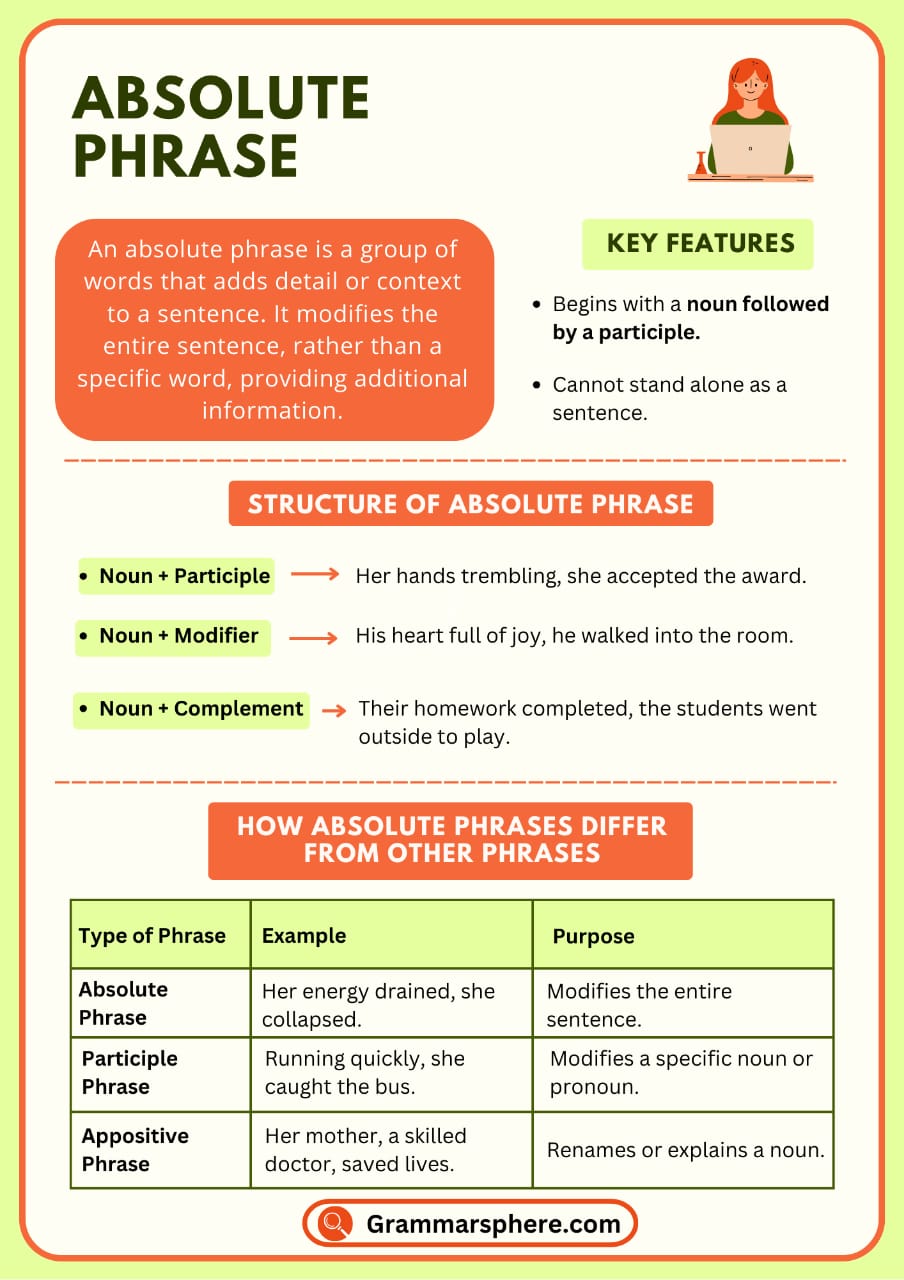
Uses of Absolute Phrases
Uses of Absolute Phrases
Absolute phrases enrich your writing by adding detail, context, and variety. They are flexible tools that help make sentences more vivid and engaging without requiring extra clauses or lengthy explanations.
1. Add Descriptive Details
Absolute phrases provide specific, vivid images that help the reader visualize a scene more clearly. They add motion, emotion, or atmosphere to an otherwise plain sentence.
- The sun setting behind the mountains, they decided to camp.
- Her face glowing with happiness, she accepted the award.
2. Provide Background Information
They offer context or set the stage for the main action, helping the reader understand what’s happening or why.
- Her heart pounding with excitement, she stepped onto the stage.
- The rain pouring heavily, they rushed inside.
3. Show Conditions or Circumstances
Absolute phrases can express the situation or condition under which the action takes place.
- The weather permitting, we will go hiking tomorrow.
- Her homework completed, she went out to play.
4. Highlight Consequences or Results
They can suggest the result of an action, linking cause and effect in a single sentence.
- His energy drained, he fell asleep immediately.
- The room cleaned and organized, they invited guests over.
5. Create Sentence Variety
Absolute phrases break up repetitive sentence patterns and add a smooth, natural rhythm to writing.
- The flowers swaying gently in the breeze, the garden looked beautiful.
- His voice trembling, he spoke to the large audience.
Absolute Phrase vs. Participial Phrase
| Aspect | Absolute Phrase | Participial Phrase |
|---|---|---|
| Structure | Noun + participle | Participle + modifiers |
| Describes | The whole sentence/situation | A specific noun |
| Removable? | Yes — sentence still makes sense | No — affects meaning or clarity |
| Set Off by Commas | Always | Often, but not always |
| Example | Her eyes closed, she rested. | Smiling brightly, she waved. |
Features of an Absolute Phrase
1. Provides Additional Information
An absolute phrase adds extra detail to the sentence but is not essential for the sentence to be complete.
- The storm raging outside, they stayed indoors.
- Her face lit with happiness, she greeted her old friend.
2. Contains a Noun and a Participle
Every absolute phrase has a noun (the subject of the phrase) and a participle (the descriptive verb form).
- The children playing in the park, their parents sat on the bench.
- The cake baked perfectly, she took it out of the oven.
3. Can Be Removed Without Changing the Sentence
Removing an absolute phrase does not affect the completeness of the main sentence.
- The rain pouring heavily, they ran to take shelter.
Without the phrase: They ran to take shelter.
- His work completed, he went to bed.
Without the phrase: He went to bed.
4. Set Off by Commas
Absolute phrases are always separated from the main sentence using commas.
- Her bag packed and ready, she waited for the cab.
- The dog barking loudly, the neighbors came outside.
5. Describes the Whole Sentence
Unlike other phrases that modify a single word, an absolute phrase describes the entire situation in the sentence.
- The sun setting behind the mountains, they decided to camp for the night.
- His heart pounding with fear, he opened the mysterious letter.
Examples of Absolute Phrases in Sentences
- The sun setting behind the mountains, they decided to camp for the night.
- Her hands trembling with excitement, she opened the gift.
- The baby sleeping peacefully, the parents watched TV.
- The rain pouring heavily, they rushed to find shelter.
- His work finished, he left the office early.
- Her voice trembling, she addressed the audience.
- The dog barking loudly, the neighbors looked outside.
- His bag packed and ready, he waited for the taxi.
- The flowers swaying gently in the breeze, the garden looked beautiful.
- Her eyes filled with tears, she waved goodbye.
Why Are Absolute Phrases Important?
1. Add Descriptive Details
Absolute phrases make writing more engaging by adding comprehensive descriptions that help readers imagine the scene.
2. Provide Context to the Main Action
They explain the background or circumstances of the main sentence, making the narrative richer without adding unnecessary sentences.
3. Create Sentence Variety
By breaking repetitive sentence patterns, absolute phrases make writing more dynamic and interesting.
4. Improve Writing Style
Using absolute phrases makes your writing more sophisticated and concise, while still being expressive.
FAQs About Absolute Phrases
1. What is an absolute phrase?
An absolute phrase is a group of words that includes a noun and a participle to provide additional information about a sentence. It is not essential for the sentence’s meaning.
2. What is the purpose of an absolute phrase?
The purpose of an absolute phrase is to add context, descriptive details, or background information to a sentence, making it more engaging and vivid.
3. How do you identify an absolute phrase?
You can identify an absolute phrase by looking for a noun (or pronoun), a participle (verb ending in -ing or -ed), and optional modifiers that describe the noun.
4. What is the difference between an absolute phrase and a participial phrase?
An absolute phrase modifies the whole sentence, while a participial phrase modifies a specific noun or pronoun in the sentence.
5. What are examples of absolute phrases?
Examples:
Her voice trembling, she addressed the audience.
The sun setting, they packed up for the day.
You May Also Like

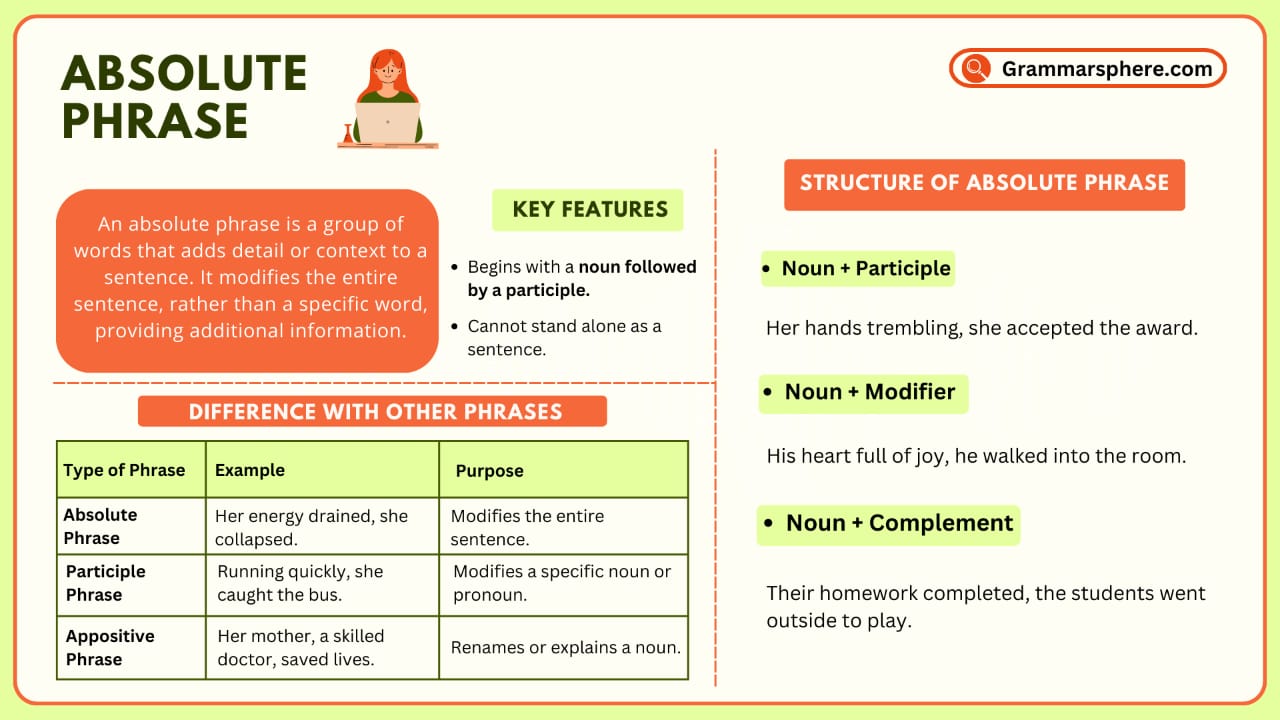
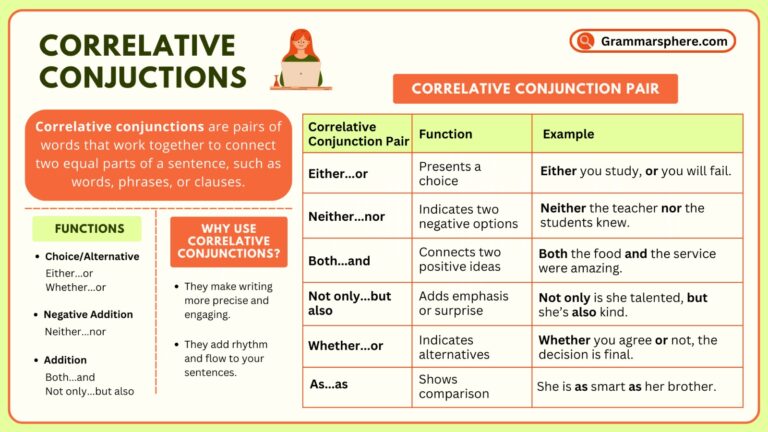
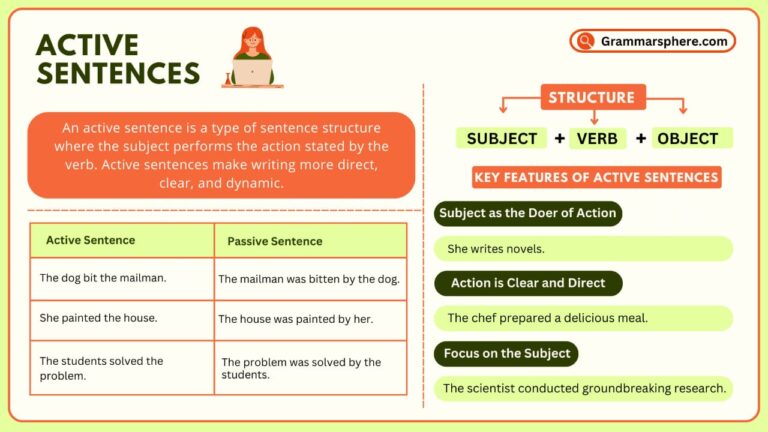
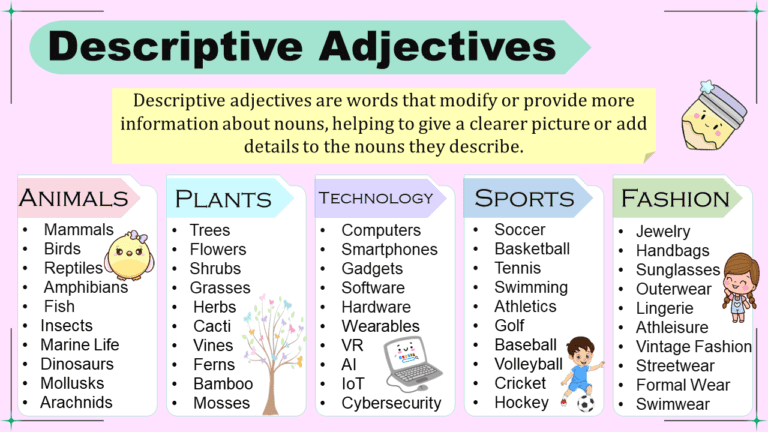
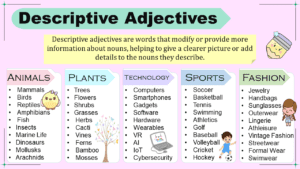
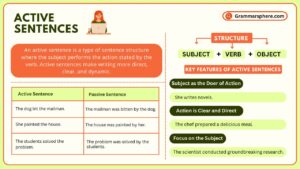
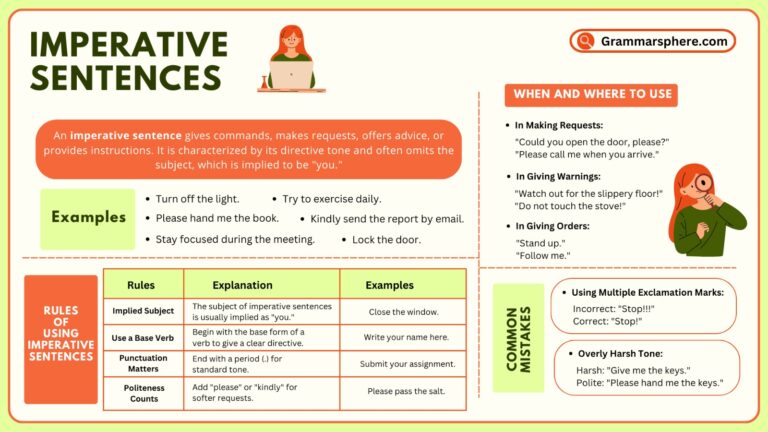
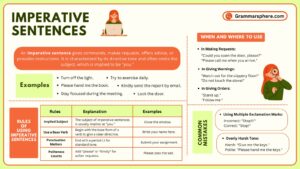
Leave a Comment